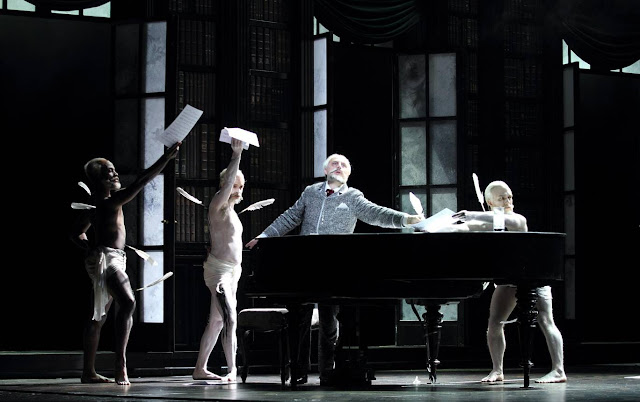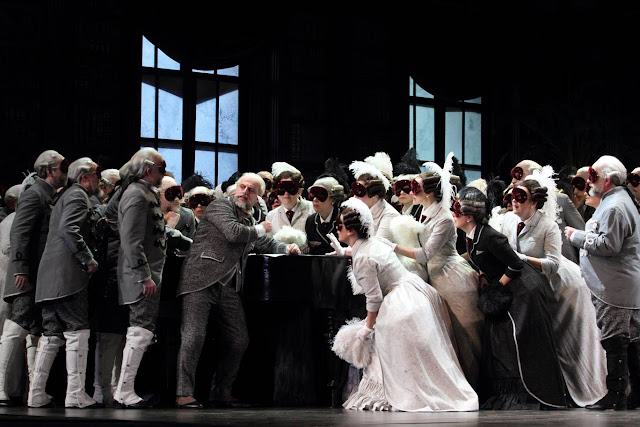 |
| Tchaikovsky: Queen of Spades - Vladimir Stoyanov - Royal Opera (Photo ROH/Catherine Ashmore) |
If you read the reviews of Herheim's 2008 Parsifal at Bayreuth you will find that many reviewers acclaim the production and say that it was something special, but few agree on what it was actually about!
For his new staging of Tchaikovsky's The Queen of Spades which debuted in 2016 in Amsterdam and came to Covent Garden this month (seen Wednesday 16 January 2019), Herheim and dramaturg Alexander Meier-Dörzenbach have turned not to the opera's history nor to Pushkin's original novella but to Tchaikovsky himself. The idea is that in this music, Tchaikovsky was channelling his angst and guilt about his homosexuality and that the extremity of the characters' emotions only makes sense in this context. So what we get isn't a dramatisation of the plot of The Queen of Spades, it neither follows the libretto nor does it follow the dramaturgy of the music, instead Herheim and Meier-Dörzenbach project the opera onto Tchaikovsky's life and mine the parallels.
Key to this approach is that the relatively minor role of Prince Yeletsky (a character who is rather boring but who, like Prince Gremin in Eugene Onegin gets a stunning aria about love) is transformed into Tchaikovsky himself. The opera opens in a grand 19th century room with Tchaikovsky (Vladimir Stoyanov) giving oral sex to a young man in military uniform (played by the singer playing Gherman), who objects and then demands money before rushing off.
In fact throughout the opera there are in fact multiple Tchaikovsky's, the male chorus appears dressed like the composer and it is clear that other characters are sometimes channelling him. The costumes mix those of the composer's period with those of the setting of the opera, and there was a feeling that all of the male principals were variants of the composer, and even Paulina (Anna Goryachova) was dressed as a young man and her aria felt a proxy for Tchaikovsky's feelings.
 |
| Tchaikovsky: Queen of Spades - Vladimir Stoyanov - Royal Opera (Photo ROH/Catherine Ashmore) |
The first is that the Tchaikovsky figure is ever present, so that Gherman and Lisa's climactic Act One duet is turned into a trio, with a degree of uncertainty of who is addressing whom, and the scene in Act Two where Gherman confronts the Countess is similarly made triadic, and towards the end the crucial dramatics are between Gherman and Tchaikovsky, with the Countess's death (caused by drinking from a glass of water, pace the composer's own death) goes almost unnoticed. In Act Three when the Countess appears to Gherman with the solution to the three card trick, the voice is ventriloquised by Tchaikovsky.
All this makes the dramaturgy a bit unclear, and you felt that an additional set of surtitles was necessary explaining what Herheim and Meier-Dörzenbach thought was going on. It was certainly not obvious, and whilst this production was entertainingly theatrical there was just too much uncertainty. Disposing of Pushkin's plot is one thing, but what we saw on stage was not capable of being interpreted clearly without further explanation.
And, of course, this being opera there were moments where the dramaturgy just could not be made to fit Herheim and Meier-Dörzenbach's scheme, and here Herheim constantly fell back on the idea of Tchaikovsky composing the opera as we went along. A piano and sheets of music paper were crucial props in many of the scenes, but we had rather too many embarrassing moments with Vladimir Stoyanov pretending to compose music (cue studious expression, vague movements of arms and some frantic scribbling), to conduct it, or to play it at the piano. None of these contributed to the drama on stage, and quite often Stoyanov's amateur dramatics pulled focus from the real drama, and frankly after three hours got rather tedious. There were other moments too, the chorus during Act One presented a problem, so in typical regie-theater style it became a rehearsal for the music!
And this is before you get to the question of whether the whole basis for Herheim's production is valid. Tchaikovsky's marriage was in 1877 and he wrote an agonised letter to his brother Modest around the same time (quoted at the beginning of the opera), but Queen of Spades was not written until 1890 by which time many commentators feel that the composer was becoming far less agonised about his homosexuality and more able to deal with it (after all plenty of 19th century men did manage to come to terms with it and find a way of living). The whole guilt ridden composer/suicide theory partly has its basis in a homophobic reading of the composer's life, and getting to the bottom of the events will probably never come about. That Herheim himself is gay and was brought up a Roman Catholic only adds piquancy to the mix. You have to sit back and enjoy the theatrics and hope no-one takes it as history.
If you could live with this then there was much to enjoy as Herheim and Pappano had drawn out some very fine musical performances. Aleksandrs Antonenko, who was due to sing Gherman, was ill and replaced by Sergey Polyakov. (I am not sure how much notice he got and whether he was already familiar with the production, and there seemed to be no statement on the ROH website). But Polyakov didn't sing from the sides, he fully performed the complex role. His performance was remarkably lyrical and rather intense, perhaps a little careful (which is completely understandable) but with a fine slow-burn leading to the climactic final act. This was a performance I would love to come across again in a more conventional production where the intensity of Polyakov's performance would be matched by the focus being on his character.
Eva-Maria Westbroek made a strong Lisa, and in the second half of the opera, particularly her moving final scene, created a passionate and conflicted character with an inner strength. But her dramatic, and sometimes uneven, voice rather lacked the inner luminosity which helps to bring out the character in the opening scenes, and Westbroek seemed too experienced and to worldly for the young naive.
Felicity Palmer was a powerfully characterful Countess, singing the Gretry aria with great poise, commanding all around her even when just wearing night-shirt, and doing everything required in her rather unsatisfactory death scene. But you could not help that given such a fine singing actress, a less reductive view of the character would have given us a richer and more thrilling view of the role.
Vladmir Stoyanov made a strong Yeletsky/Tchaikovsky (he played the role in Amsterdam when the production as new), contributing a fine account of the moving aria as well as doing everything required of him as Tchaikovsky.
The lesser characters all tended to get a little bit pushed to the background with individuals failing to be differentiated. Productions, like that of Anthony MacDonald at Grange Park Opera in 2014 [see my review], which bring out the background detail for each character help fill out the characters. Here, Tomsky (John Lundgren), Cherkalinsky (Alexander Kravets) and Surin (Tigran Matrirossian) tended to form a generic trio and it was only in the last act that Lundgren's fine Tomsky came to the fore. The smaller roles were all well taken, with Anna Goryachova giving a moving account of Paulina's aria, and Renata Skarelyte demonstrating her dancing skills as Masha!
The chorus was on strong form, giving us some fine singing and having great fun with Herheim's theatrical effects. Antonio Pappano drew a wonderfully passionate account of the score from the Royal Opera Orchestra and I would imagine that the broadcast of this on BBC Radio 3 will be essential listening.
This was a fascinatingly theatrical evening, and if you wanted a vivid stage diversion then this was it. Philipp Furhofer's set was in constant motion, creating some dazzling effects but making the scene rather restless. The way both set and dramaturgy kept changing the point of view made me think that this wasn't so much an opera production than a film manque, and that perhaps someone should invite Herheim to direct a film of the opera. Now that would be worth seeing.
Tchaikovsky Queen of Spade; Sergey Polyakov, Eva-Maria Westbroek, Vladimir Stoyanov, Felicity Palmer, dir: Stefan Herheim, cond: Antonio Pappano; Royal Opera House
Reviewed by Robert Hugill on 16 January 2019 Star rating: (★★½)
Herheim's radical re-working of Tchaikovsky's opera which confusingly places the composer at the centre of the drama
Queen of Spades is in repertoire at the Royal Opera until 1 February 2019, see website for details.Herheim's radical re-working of Tchaikovsky's opera which confusingly places the composer at the centre of the drama
The opera will be showing on the ROH's Live Cinema season on 22 January 2019, see website for details.











No comments:
Post a Comment